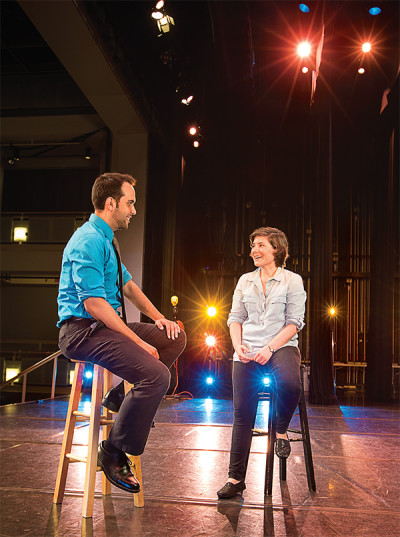
George Place '62 (left to right), Jed Bullen '61, and Jack Kavanagh '62 at The Villa in Wayland, Mass.

George Place ’62 ● Jed Bullen ’61 ● Jack Kavanagh ’62
In the late 1950s, three friends realized they faced their last chance. On the campus of a Wellesley school then known as Babson Institute, the time had come to get serious, buckle down, and grow up. “Babson was a do-or-die situation for us all,” says George Place ’62.
Place, Jack Kavanagh ’62, and Jed Bullen ’61 had spent the years following high school pushing off the notion of settling down. They each had taken a “sabbatical,” as Kavanagh puts it, in the military, and that service had taken them to faraway places. But returning home, they needed to finish their education. All three had attended various colleges without earning a degree. Place even had taken classes at Babson, but left. “Today, they might say we were late bloomers,” Kavanagh says. “But we were wiseguys.”
Babson was on to them. As he started at the school, Kavanagh remembers the dean of students giving him a warning: “If you haven’t wised up by now, we will take your money for a semester and then throw you out.” Those words were stern, but the trio was grateful to Babson for giving them one more chance. “I was buoyed that someone believed in me when most everyone else thought I was a screw-up,” says Kavanagh, a Brookline, Mass., resident.
Kavanagh, Place, and Bullen grew close at Babson, but the beginnings of their friendship go back to childhood in Waban, Mass. Place and Kavanagh first met in the second grade, and Bullen’s sister, Anne, was also in their class. The trio reconnected at Babson. “The first class I walked into, they were sitting there,” Kavanagh says. “It was deja vu.” The friends were among the group of older students, many of them veterans, who were known as “dayhops” because they lived off campus. Outside of meetings of the school’s veteran’s club, the threesome mostly hung out between classes. Perhaps surprisingly given their history, their grades soared. The wiseguys had wised up. “For me, Babson was a starting point to settle down,” says Bullen, who lives in Grafton, Mass.
The friends went on to earn their degrees and enjoy successful careers. Bullen became an accountant, Kavanagh a food broker. Place worked as a stockbroker, then in real estate development. Despite the passage of years and the demands of life, they continued to stay in touch. Nowadays, they meet monthly for lunch with two other retired friends and even have given their informal men’s group a name. What that name is, however, depends on whom you ask. Place believes they christened themselves The Retired Old Guys, or TROG. Kavanagh, though, thinks the name is The Retired Old Gentleman’s Society, or TROGS. “Gentleman doesn’t apply to any of us,” counters Place.
Their usual lunch spot is The Villa, an Italian restaurant in Wayland, Mass., where the food is filling and the management is tolerant of a boisterous group who may hog a table for a few hours. “They put up with us,” Bullen says. The group’s conversation is unrestrained, with politics a frequent topic. The men aren’t afraid to state an opinion, no matter how contentious. “The gloves come off right after sitting down,” says Place, a Wayland resident.
The men also aren’t afraid to poke fun. “We insult each other with whatever ammunition we have at our disposal,” Place says. Scouring the Web, they load up with jokes to tell during their meals. “Often our jokes are not politically correct,” Place says, “so we have to make an effort to keep our humor from reaching nearby tables.” The men typically request a table that’s far from other customers.
When the three friends delve into their long history together, the details sometimes proving slippery, they talk of old drinking stories, of old professors and old jobs, and of how far their alma mater has come since they graduated. Fifty-plus years have passed since their Babson days. Over the decades, the friends admit that there were patches when one of them would fade away for a time. Work or family responsibilities would make staying in touch difficult. But sure enough, after a while, the lost friend would reappear. No one was made to feel guilty for being absent. Instead, the friends focused on the here and now. “We picked up like nothing had happened,” Kavanagh says.

Monica Chang ’87 ● Dena Bancroft ’87 ● Michael Bastian ’87
On a Wednesday afternoon in New York City, Dena Bancroft and Monica Chang pay a visit to the studio of fashion designer Michael Bastian. Situated on busy 11th Avenue in Chelsea, not far from the Hudson River, the studio is in a building full of artists and other designers. Light streams in from the large windows, and pictures and clippings that Bastian uses for inspiration are pinned to a bulletin board.
The three friends are from the Class of ’87, and they met in the fall of 1983, 30 years ago, as incoming first-years. As they sit in the studio, racks of the latest line of Bastian’s clothes hanging along the wall, they settle easily into each other’s company. “When you are with close friends, there’s a familiarity you have,” says Chang. “There is no pretension.”
In their years at Babson, the trio had many good times. They often hung out in Boston, taking the shuttle to the Riverside T stop and then on to the Harvard Book Store Cafe on Newbury Street, winding up in the music and dance clubs around the Fenway area. On campus, though, they often felt out of step. The other students seemed so sure of themselves, so in sync with each other. “Everyone was going in the same direction,” Chang says. “We were trying to find our place, and we found each other.”
At the time, Bancroft was into mod fashion, a British look from the 1960s. On a preppy campus with an “accounting vibe,” where some students even wore pocket protectors, she looked as if she came from another planet. “I was such a misfit,” Bancroft says. Bastian remembers the first time he spotted her in Trim. She was wearing cuffed jeans, an oversized sweatshirt, and pointy shoes. “She was like a peacock in a chicken house,” he says. “You didn’t miss her.”

Photo: Michael Piazza
Monica Chang (left to right), Dena Bancroft, and Michael Bastian, all ’87, at Bastian’s studio in New York City
The three friends had trouble connecting to their courses as well. When visiting colleges, Bastian had felt at home on Babson’s bucolic campus, but once classes started, he came to a disheartening realization: “I was bad at numbers.” Struggle followed. He failed economics twice while others sailed along. “It was so easy for so many people,” he says. Chang was so unsure of what to study that she kept switching concentrations. She ended up with three in the end. “I was so lost,” she says. “I wanted to do interior design at the time.” On top of that, she was dealing with not only a new school but also a new country. She had come from Hong Kong only a year or so earlier and found herself on a campus that was far less international than it is today. There were just three other Asian students.
After graduation, the three friends took off for new adventures. Bancroft left for San Francisco. Earlier, a fortuneteller had told her that she would live there, and Bancroft never shrugged off the prediction. “I internalized it,” she says. “I decided she was right.” Other moves have followed, and today she lives in Lenox, Mass., a town in the Berkshires. Bastian and Chang, meanwhile, moved to New York City, where they spent their Saturdays thrift shopping. The roommates shared a tiny yet expensive Brooklyn apartment that had mice, as well as a dog, Mr. Pea, who proved useless as a deterrent against burglars. Through the years, Bastian never left the city, and while Chang now is a Chestnut Hill, Mass., resident, she lives and works in New York City during weekdays.
Despite his academic troubles, Bastian has become a successful businessman and popular designer. “He was always dreamy and poetic in school,” Chang says. “He was probably the most unambitious person we knew. Seeing him so successful is fantastic.” Chang is senior director, strategic fashion accounts, for Lectra, which sells fashion software, and Bancroft works through a nonprofit to teach sex education to high school students. She swears it’s not as uncomfortable and awkward as it sounds. “It’s like any other subject,” she says.
The three friends communicate often, with Bancroft and Chang attending Bastian’s fashion shows whenever they can. For one of his latest lines, Bastian actually used Bancroft as inspiration. Wanting to channel her Babson mod years when designing his clothes, Bastian had asked her for old college photos. That her look proved so memorable all these years later more than surprised Bancroft. “I was shocked,” she says.
As they chat together in Bastian’s studio, the talk revolves around family and business, around aging and how their 50th birthdays creep closer. “It’s the biggest cliche in the world, but it does fly by so fast,” Bastian says. “When you’re in college, those four years seem endless.” Despite the passing years, Bastian believes he and his friends are essentially the same people. “I don’t think I’ve changed at all.” Looking at Bancroft and Chang, he says, “I don’t think you have changed at all either.”

Darius Eslami ’09 ● Jeannie Depatie ’09
Darius Eslami and Jeannie Depatie, both ’09 and veterans of the Babson Players theater group, know the moment all too well, that anxious yet intoxicating instant when the stage goes from dark to light and the show begins. “The lights’ going up is one of the best feelings,” Eslami says. “Anything can happen. Your heart stops for a split second.” As the show rushes along from scene to scene, the cast and crew focus on one goal: making the performance as great as it can be. Nothing else matters. “When it’s over, you take a breath,” Depatie says.
This experience, one of adrenaline and butterflies but also of creativity, passion, and community, has kept Depatie and Eslami returning to the theater again and again. They each became involved with the stage during high school, where Depatie discovered how happy the theater made her and the introverted Eslami used acting to force himself to be more social.
While students at Babson, the two became friends, working on seven shows together with the Players—Depatie helping behind the scenes, Eslami appearing onstage or assisting off it. In their first semester, they bonded while tearing down the set of Whose Wives Are They Anyway? The play’s run had ended, and the two crew members hauled platforms, props, and anything else that could be reused in a future show down to the old, dark basement of Knight Auditorium for storage. It was late and raining, and the basement was rumored to be haunted. “I would believe it,” Depatie says. “It’s creepy down there.”

Photo: Tom Kates
Darius Eslami (left) and Jeannie Depatie, both ’09, at the Sorenson Center for the Arts
Work has taken over a large portion of the friends’ lives since they graduated. A Natick, Mass., resident, Depatie is a marketing data specialist at PTC, a Needham software company. Eslami lives in Quincy, Mass., but he also works in Needham at North Hill, a senior living community, as an event and social media coordinator. Still, the friends make time to see each other, sometimes for lunch or dinner, sometimes for rehearsal. Their love of the stage not fading, the two often work together in community theater.
It’s a big commitment, especially when trekking to rehearsal after a long day at the office. “You have a half-hour to do dinner, and then you’re back at the theater,” Depatie says. “It takes more out of me now.” Magic may happen on the stage, but conjuring that magic takes hard work. Sometimes shows can seem on the brink of falling apart in rehearsal as things go wrong and people grow agitated. “There’s a lot of chaos in theater,” Depatie says. “There’s always a point in a show when you wonder, ‘Why are we doing this?’”
This past summer, Depatie and Eslami came back to Babson to co-direct a production that had its fair share of such moments. The performance consisted of one-act plays by playwright Christopher Durang and featured current and former Babson Players in the roles.
The directors worked in tandem to solve the tricky situations that arose. The show had no budget, so props were borrowed from a theater in New Hampshire, and because the show was running too long, the script was cut just two days before opening. A couple of cast members also regrettably dropped out, which meant Eslami had to fill in at the last minute.
For the two friends, all this headache and hassle is worth it. “We like theater,” Eslami says. “We want to make theater happen.” Besides, plays come and go. Life goes on. “There’s always another show,” Depatie says.
On a recent afternoon, the two friends take some time off from their jobs to meet up at the Sorenson Center for the Arts, the site of so many of their good times together. They talk theater, but also about TV shows and video games and Depatie’s upcoming wedding. Her fiance just downloaded an app that counts down the days. “We’re 427 days away, and we already have a venue,” she says. “So far, so good.”
Being young alumni, only having graduated four years ago, more responsibilities may creep up that make maintaining a friendship difficult as the years go by. Eslami and Depatie don’t worry about that. “At the very least, I’ll always see you at the theater,” Eslami tells Depatie. “As long as there’s theater or Jeannie’s buffalo chicken, we’ll still be friends. Jeannie makes very good buffalo chicken.”
